

- SECURITY, RECONSTRUCTION AND PEACE
- ECONOMIC DEVELOPMENT AND EMPLOYMENT
- RURAL DEVELOPMENT
Sudan
The Deutsche Gesellschaft für Internationale Zusammenarbeit (GIZ) GmbH resumed its engagement in Sudan in 2014, after almost three decades of absence due to a prolonged civil war. Since the military coup in 2021, GIZ has focused exclusively on initiatives that directly support the Sudanese population.
Sudan ranks among the poorest countries in Africa. The ongoing conflict has severely impacted household incomes, social cohesion, local governance structures, and access to clean energy. According to the United Nations, more than one-third of the country’s population faces acute food insecurity. Consequently, over 16 per cent of the population has fled the country, and, particularly as a result of ongoing conflict, over nine million people are internally displaced. By the end of 2023, 6.7 million people in Sudan were already at risk of gender-based violence (GBV). Additionally, less than a third of all Sudanese households have access to electricity.
Furthermore, women-led households are particularly affected by low-incomes and food insecurity and it is hard for women led businesses to establish themselves on the market. In the eastern parts of the country, farmer groups struggle to adapt to changing environmental conditions and produce enough food to sustain their families and earn incomes. These challenges also affect refugees and migrants from neighbouring countries such as Eritrea. Due to social exclusion and a weak economy, these refugees face limited opportunities for livelihood security. Nonetheless, civil society actors, who played a crucial role in the political changes of 2018/19, continue to lead local emergency response efforts, document human rights violations, and foster community dialogues to counter polarisation.
GIZ is supporting local communities in improving their livelihoods, despite the challenging circumstances they face. The organisation collaborates with national, regional, and international implementing partners, as well as civil society actors. Together, they reach Sudanese host community members, internally displaced persons (IDPs), and refugees. Their collective focus includes:
- Local governance, social cohesion and psychosocial support
- Resilience building
- Women’s economic empowerment
Selected Sudanese civil society actors, both inside and outside the country, receive organisational development and networking support, along with funding for activities related to peacebuilding, civic education, and advocacy. This support places particular emphasis on engaging youth and empowering women.
In the eastern states of Kassala and Gedaref, a formally registered and operational farmer network has been established, comprising 26 constituent units across both host communities and refugee camps. This network operates five agricultural machinery hubs, providing equipment to improve farming efficiency. Additionally, semi-urban and rural households, as well as smallholder farmers, receive support to access electricity through small-scale, decentralised solar solutions.
Networking and exchange between local and refugee women’s organisations are supported to enhance their management skills, enabling them to implement their own projects, and build their organisations. Refugees, internally displaced persons, and host community members participate in further education programmes focused on income generation, livelihood improvement, life skills, and social cohesion, such as financial literacy, vegetable growing, small livestock keeping, and psychosocial support. Female-led households receive monthly cash transfers for specific durations to cover basic needs.
The main commissioning party is the Federal Ministry for Economic Cooperation and Development (BMZ).

